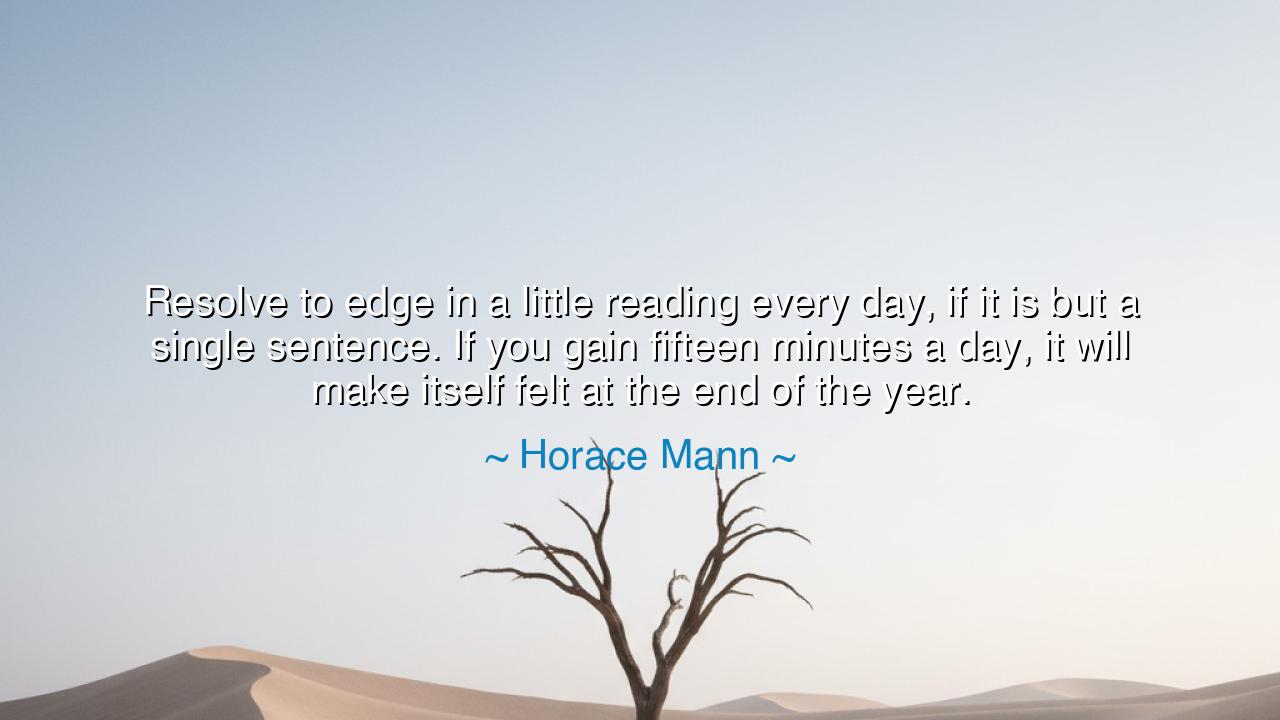
Resolve to edge in a little reading every day, if it is but a
Resolve to edge in a little reading every day, if it is but a single sentence. If you gain fifteen minutes a day, it will make itself felt at the end of the year.






"Resolve to edge in a little reading every day, if it is but a single sentence. If you gain fifteen minutes a day, it will make itself felt at the end of the year." These words of Horace Mann, the great American educator and reformer, shine with the quiet brilliance of timeless wisdom. Beneath their simplicity lies a profound truth about the power of small, consistent effort—that the mind, like a field, grows fertile not through sudden storms, but through the gentle, daily rain of discipline. Mann, who devoted his life to spreading education to every child in the new republic, knew that learning was not a gift granted to a few, but a treasure available to all who choose to seek it—one sentence, one moment, one day at a time.
To understand this quote is to understand the man who spoke it. Horace Mann, often called the “Father of American Education,” lived in the nineteenth century, a time when schooling was a privilege rather than a right. He believed that the strength of a nation rested not upon wealth or conquest, but upon the intelligence and virtue of its citizens. His life’s work was to awaken that intelligence, to make learning not a luxury, but a duty and a joy. In this quote, he urges us not toward grand gestures, but toward steady progress. For he knew that the greatest transformations of the mind do not come in a single day of inspiration, but through faithful, patient accumulation—the quiet miracle of daily reading.
There is a hidden rhythm in his words, one that echoes the teachings of the ancients. The philosophers of Greece spoke of arete—excellence born not of talent, but of constant practice. The sages of the East taught that to master the sword, one must train even when no battle looms. So too did Horace Mann apply this eternal law to the mind: that knowledge, like strength, must be exercised daily, even if only for a few minutes. The fifteen minutes he speaks of are symbolic—they are the humble doorway through which greatness enters. For every sentence read, every thought pondered, every spark of curiosity entertained becomes a thread woven into the tapestry of wisdom.
Consider the story of Abraham Lincoln, born in a log cabin, raised in poverty, and yet destined to become one of history’s greatest leaders. As a boy, Lincoln could afford neither teachers nor books. Yet he followed the very principle Mann describes: he read a little each day. He borrowed books from neighbors, studied by the light of a fire, memorized sentences as he worked. Those minutes of learning, gathered day by day, shaped the eloquence of his mind and the depth of his character. In him, the truth of Mann’s words found its living embodiment—that a few moments of reading each day can change the course of a lifetime.
What Mann calls for is not only intellectual diligence but spiritual devotion to growth. To “edge in a little reading every day” is to make learning a ritual, a quiet act of reverence toward the gift of consciousness itself. It is to say, “I will not let this day pass without feeding my mind.” In an age where distraction reigns and silence is rare, this resolve becomes even more sacred. For fifteen minutes of true attention, spent in communion with wisdom, can bring more peace and insight than hours of idle noise. Mann’s advice, though born in the 1800s, speaks directly to the restless soul of the modern world.
There is also in his words a promise—“it will make itself felt at the end of the year.” This is the law of accumulation, the arithmetic of wisdom. A single drop may seem nothing, but thousands fill the ocean. One page may seem trivial, but hundreds birth understanding. Each day of reading compounds quietly, until what once felt small becomes immeasurable. The man who reads daily, even briefly, builds a fortress of knowledge around his mind. He learns patience, humility, and discipline—the virtues that no sudden burst of effort can ever bestow.
Let this, then, be the lesson handed down: make reading a daily vow, not as a duty, but as a nourishment for the soul. Do not wait for the perfect time or the grand inspiration—begin with a single line. Carry a book in your pocket, a verse in your memory, a question in your heart. Let fifteen minutes a day become your offering to the temple of knowledge. For, as Horace Mann teaches, the true power of learning lies not in intensity, but in consistency. And he who reads a little each day walks, unknowingly, the same path as sages, poets, and visionaries before him—the path that leads, step by steady step, to the fullness of wisdom and the freedom of the mind.






AAdministratorAdministrator
Welcome, honored guests. Please leave a comment, we will respond soon